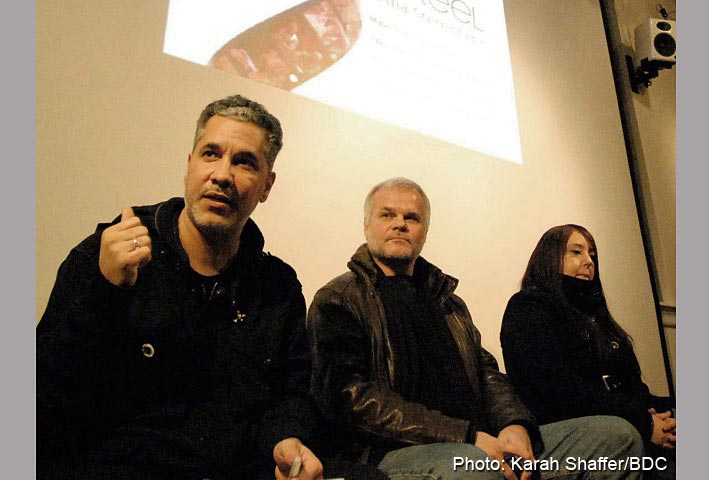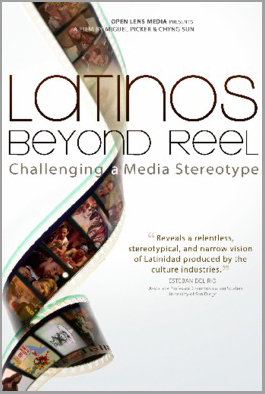MEDIA / PRESS
Independent Sources: American Promises
Published on Apr 24, 2014
On this edition of Independent Sources hosted by Sarah Pizon, we speak to filmmaker Michele Stephenson about her award-winning documentary "American Promise," which examines the race gap in America's education system, we talk to filmmaker Edwin Pagan about "Latinos Beyond Reel", a film which aims to start a conversation on negative media portrayals of Latinos, and we profile VentureOutNY, which helps foreign companies set up shop in New York's growing tech sector. (Taped: 04-21-2014)
Independent Sources is where viewers meet the ethnic press. IS engages journalists from New York's ethnic and mainstream media in an insightful discussion of stories covered by ethnic newspapers, TV and radio stations and websites. Each show features an in-depth profile of a news organization or a reporter, along with a news roundup. Independent Sources IS an informative, innovative half hour about New York's fastest growing news sector..
"LATINOS BEYOND REEL: Film hopes to change Latino stereotypes in media"
 Kristina Puga, NBC Latino @kristinapuga (originally published 03/13/2013)
Kristina Puga, NBC Latino @kristinapuga (originally published 03/13/2013)
Miguel Picker was tired of working in the media and film industry for more than two decades and continually seeing Latinos being depicted negatively, and not enough in the important roles they play in real life. So he and a small crew decided to take matters into their own hands and make their own film. A little more than two years later, and “Latinos Beyond Reel” has been distributed by Media Education Foundation, to universities, high schools and libraries in more than 40 states across the country. The film has recently had two screenings in New York City — with plans for more.

“We decided to make this film to understand who we are,” says Picker, the Chilean-born Emmy-winning filmmaker. “It is something I hope opens us as Latinos and can open a discussion of how we can change the media landscape — like a kick in the butt.”
The 80-minute documentary features interviews with myriad Latinos who are involved in education, Hollywood, and the media all over the U.S., including filmmakers Bernardo Ruiz and Alex Rivera.
Moctesuma Esparza, the CEO of Maya Cinemas, remembered watching a movie on television when he was a boy.
“I remember seeing this slobbering drunk who was supposed to be Pancho Villa…that was a complete lie and distortion of reality,” he said. “Pancho Villa didn’t even drink. He was an immaculately-dressed military general…an intelligent strategic figure who had an ideology and a purpose. This depiction that I saw in Hollywood…was poisoning my mind — distorting the image of what it was to be Mexicano.”
Edwin Pagan, the cinematographer of “Latinos Beyond Reel,” agrees on the power images in films and media can have over the viewer.
“People’s lives can be changed for better or worse, and we need to make a stand for better stories to be made about our communities, and take charge of the reigns to make our own stories,” he says. “We need to get positions of power and not become complacent.”
Pagan says that he’s beginning to see a push in the right direction in Hollywood.
“One person alone is not going to change its habits,” he says. “In addition to education, and saying this is not right…we need to get together and put a little pressure…things change. People can make a change.”
He points to how “Latinos Beyond Reel” might have played a part in Lupe Ontiveros’ image being added to the Oscars In Memoriam photo gallery. Pagan says although he doesn’t own a television, he saw the reaction of his fellow Latinos on Facebook, and decided to take action.
“I took a clip from the movie [featuring Ontiveros in her various acting roles] and added in the middle, ‘Shame on the Academy for not including her in the in memoriam gallery and observance,’” says Pagan about the short video [below] he posted about the iconic Latina actress that got a lot of attention. “Two days later, they added her image to the gallery.”
Picker says that in his more than 20-year career in the industry, he feels it has improved a little, but not enough to balance the change in demographics.
“If you want to do a film on Abraham Lincoln, for example, I’m not going to get that job,” he says. “If I’m Latino, I can’t do something not about Latinos, but a program that’s done about Machu Picchu, the experts are Western, not Latino experts.”
Picker and Pagan say they want to build a website where this discussion can be channeled and create a dialogue between the Latino community, which will hopefully reach the national level.
“I would get e-mails saying, ‘Thank you for saying things how they are — for putting it in a historical context. The discussions were really nice,’” says Picker about the audience reaction after the screenings in NYC. “I want people to realize it’s not about us getting into the industry, but us changing the industry.”


